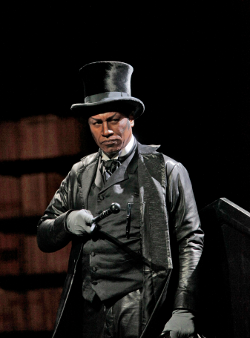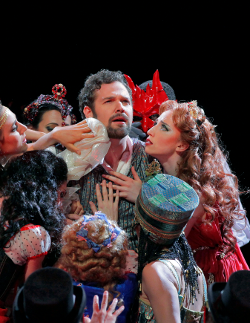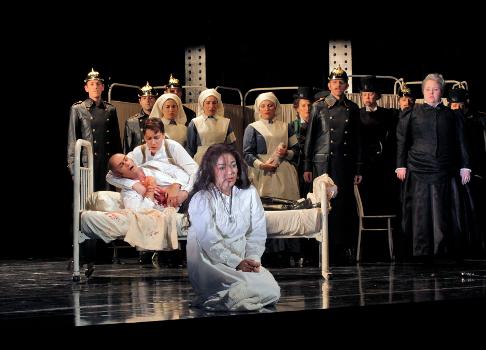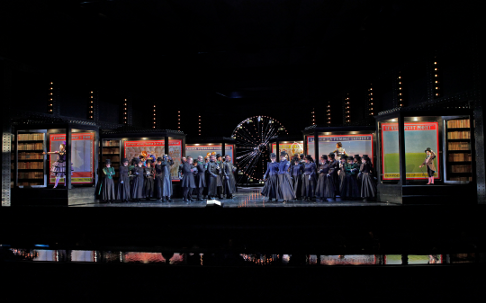![Ailyn Pérez as Marguerite and Bryan Hymel as Faust [Photo by Ken Howard courtesy of Santa Fe Opera]](http://www.operatoday.com/FST2_1262a.png)
10 Jul 2011
Faust Reaches Santa Fe Opera — And How!
The celebrated New Mexico opera festival has, in its fifty-fifth season, created a production of Charles Gounod’s 1859 masterpiece Faust, its first ever.
English Touring Opera are delighted to announce a season of lyric monodramas to tour nationally from October to December. The season features music for solo singer and piano by Argento, Britten, Tippett and Shostakovich with a bold and inventive approach to making opera during social distancing.
This tenth of ten Live from London concerts was in fact a recorded live performance from California. It was no less enjoyable for that, and it was also uplifting to learn that this wasn’t in fact the ‘last’ LfL event that we will be able to enjoy, courtesy of VOCES8 and their fellow vocal ensembles (more below …).
Ever since Wigmore Hall announced their superb series of autumn concerts, all streamed live and available free of charge, I’d been looking forward to this song recital by Ian Bostridge and Imogen Cooper.
Although Stile Antico’s programme article for their Live from London recital introduced their selection from the many treasures of the English Renaissance in the context of the theological debates and upheavals of the Tudor and Elizabethan years, their performance was more evocative of private chamber music than of public liturgy.
Evidently, face masks don’t stifle appreciative “Bravo!”s. And, reducing audience numbers doesn’t lower the volume of such acclamations. For, the audience at Wigmore Hall gave soprano Elizabeth Llewellyn and pianist Simon Lepper a greatly deserved warm reception and hearty response following this lunchtime recital of late-Romantic song.
For this week’s Live from London vocal recital we moved from the home of VOCES8, St Anne and St Agnes in the City of London, to Kings Place, where The Sixteen - who have been associate artists at the venue for some time - presented a programme of music and words bound together by the theme of ‘reflection’.
'Such is your divine Disposation that both you excellently understand, and royally entertaine the Exercise of Musicke.’
‘And there was war in heaven: Michael and his angels fought against the dragon; and the dragon fought and his angels, And prevailed not; neither was their place found any more in heaven … that old serpent … Satan, which deceiveth the whole world: he was cast out into the earth, and his angels were cast out with him.’
There was never any doubt that the fifth of the twelve Met Stars Live in Concert broadcasts was going to be a palpably intense and vivid event, as well as a musically stunning and theatrically enervating experience.
‘Love’ was the theme for this Live from London performance by Apollo5. Given the complexity and diversity of that human emotion, and Apollo5’s reputation for versatility and diverse repertoire, ranging from Renaissance choral music to jazz, from contemporary classical works to popular song, it was no surprise that their programme spanned 500 years and several musical styles.
The Academy of St Martin in the Fields have titled their autumn series of eight concerts - which are taking place at 5pm and 7.30pm on two Saturdays each month at their home venue in Trafalgar Square, and being filmed for streaming the following Thursday - ‘re:connect’.
The London Symphony Orchestra opened their Autumn 2020 season with a homage to Oliver Knussen, who died at the age of 66 in July 2018. The programme traced a national musical lineage through the twentieth century, from Britten to Knussen, on to Mark-Anthony Turnage, and entwining the LSO and Rattle too.
With the Live from London digital vocal festival entering the second half of the series, the festival’s host, VOCES8, returned to their home at St Annes and St Agnes in the City of London to present a sequence of ‘Choral Dances’ - vocal music inspired by dance, embracing diverse genres from the Renaissance madrigal to swing jazz.
Just a few unison string wriggles from the opening of Mozart’s overture to Le nozze di Figaro are enough to make any opera-lover perch on the edge of their seat, in excited anticipation of the drama in music to come, so there could be no other curtain-raiser for this Gala Concert at the Royal Opera House, the latest instalment from ‘their House’ to ‘our houses’.
"Before the ending of the day, creator of all things, we pray that, with your accustomed mercy, you may watch over us."
The doors at The Metropolitan Opera will not open to live audiences until 2021 at the earliest, and the likelihood of normal operatic life resuming in cities around the world looks but a distant dream at present. But, while we may not be invited from our homes into the opera house for some time yet, with its free daily screenings of past productions and its pay-per-view Met Stars Live in Concert series, the Met continues to bring opera into our homes.
Music-making at this year’s Grange Festival Opera may have fallen silent in June and July, but the country house and extensive grounds of The Grange provided an ideal setting for a weekend of twelve specially conceived ‘promenade’ performances encompassing music and dance.
There’s a “slide of harmony” and “all the bones leave your body at that moment and you collapse to the floor, it’s so extraordinary.”
“Music for a while, shall all your cares beguile.”
The hum of bees rising from myriad scented blooms; gentle strains of birdsong; the cheerful chatter of picnickers beside a still lake; decorous thwacks of leather on willow; song and music floating through the warm evening air.
![Ailyn Pérez as Marguerite and Bryan Hymel as Faust [Photo by Ken Howard courtesy of Santa Fe Opera]](http://www.operatoday.com/FST2_1262a.png)
The celebrated New Mexico opera festival has, in its fifty-fifth season, created a production of Charles Gounod’s 1859 masterpiece Faust, its first ever.
It is a mega-show that happily falls into the success column, despite some excesses and an occasional mis-fire. This commentary is based on the second performance, July 6, with eye-watering toxic fumes and particulates still in the air from the forest fires that have been surrounding Santa Fe, forcing the Opera to hire school gymnasia for rehearsals. If circumstances have been hard on the singers and production staff, as they surely have, it is almost miraculous that so complex a show opened on time and in reasonably good order.
 Mark Doss as Méphistophélès
Mark Doss as Méphistophélès
Here is a taste: The cassetta of jewels, directed by the composer to be left by Méphistophélès in Marguerite’s garden to impress the innocent maid as a token of Faust’s affection, was instead a large Tiffany-esque show window, wheeled in from stage right, loaded with glittering jewelry and large enough for Marguerite to enter and make her selection; even her portly duenna, Marthe, wiggled in and grabbed up whatever Marguerite left behind. When it was time for the soldiers’ chorus, they executed a smart drill, wearing long greatcoats and spiked helmets that might have betokened the Franco-Prussian war, and when the bucolic Kermesse (village fair) scene arrived, it was equipped with a Ferris wheel (history’s first was at the Chicago World’s Fair 1893), while the merry singing and dancing took place amidst a carnival midway of gaudy freak shows, with uni-cyclists, stiltists and roller-skating. In fact, Marguerite makes her entrance upon roller skates! No, I did not make that up.
 Clockwise from top: Bryan Hymel as Faust, Mark Doss as Méphistophélès, Gabrielle Zucker as Helen of Troy, Kessa Huey as Cleopatra, Kristin Osler as Manon, Heidi Kershaw Carmen, Hallie Brenner Dalsimer as Salome and Jasmine Quinsier as Delilah
Clockwise from top: Bryan Hymel as Faust, Mark Doss as Méphistophélès, Gabrielle Zucker as Helen of Troy, Kessa Huey as Cleopatra, Kristin Osler as Manon, Heidi Kershaw Carmen, Hallie Brenner Dalsimer as Salome and Jasmine Quinsier as Delilah
Action was constant, and with much busy detail, and if it was anachronistic, well never mind! One had to chuckle that Marguerite, as she sang the ballad of the King of Thulé, avidly worked at her humming Singer sewing machine rather than the traditional spinning wheel. The production continued in such style for much of the evening. It must have been exhausting and expensive to mount. While there were small moments that needed tightening or fine-tuning, I expect by the full repertory run in August all will be well polished to the satisfaction of those seeking gaudy entertainment, even if the first three acts were combined into a 90-minute Marathon before the single intermission.
Frédéric Chaslin, the French conductor, pianist and composer, in his second year as principal conductor at Santa Fe, proved the musical jewel of the evening. His orchestra was alert, accurate and highly responsive to his direction. He did linger now and then with a slow tempo, but the waltz scene and later the rarely played ballet of courtesans, ticked along crisply and with élan. I hope we hear a lot of Chaslin in his native opera repertory. He’s the real thing! And how very pleasant to hear French opera with a Frenchman in the pit. Bravo!
Santa Fe has always been a company that seemed to spend more on production values than on vocal talent, but that alone cannot account for a certain mediocrity that beset the singing cast, with one exception: Ailyn Pérez in a strongly sung musically solid performance of Marguerite, the star of the show. Her French pronunciation had its Hispanic moments, but the free flow of tone, her ease in the top soprano register, and her energy and ability to enter into hyper-action staging won deserved applause. Basso Mark Doss, senior member of the cast appropriately appearing as Méphistophélès, was totally into his role, aided by experience and purpose in his portrayal; vocally, he was underpowered and was too often unheard over the orchestra. I would have rather heard him as Leporello in the Mozart opera.
 Background left: Matthew Worth as Valentin, Jennifer Holloway as Siébel and Chorus, Foreground: Ailyn Pérez as Marguerite
Background left: Matthew Worth as Valentin, Jennifer Holloway as Siébel and Chorus, Foreground: Ailyn Pérez as Marguerite
Tenor Mark Hymel had the high-lying phrases for his demanding title role and gave pleasure with his well achieved high tones, even if his bright tenor was a bit lacking in body and seemed nonexistent in the lower register. Few tenors today are reliable in this classic tenor role once graced by the likes of Jean de Reszke and Jussi Bjoerling (they don’t make ‘em like that any more). A young lyric baritone, Matthew Worth, qualified as a French bariton martin, with a pleasant light voice suited to such as Pelléas or Massenet’s Juggler, Jean. Worth was not equipped with the kind of burly vocal weight needed to make Valentine credible. He played the part well and was touching in his scenes with Marguerite.
In smaller but important roles, Jennifer Holloway was effective as Marguerite’s teenage suitor Siebel, here given two arias rather than only the usual Flower Song, while the greedy duenna Marthe was ably presented by mezzo Jamie Barton, though Faust’s wine-loving friend Wagner, was only faintly heard as sung by another too-light baritone, Darik Knutsen. The 2200-seat Santa Fe house is a kind host to larger voices that project well – such are much needed.
The antic stage direction was by the noted Stephen Lawless aided by Belgian scenic designer Benoit Dugardyn, who made good use of the full stage and whose work was colorful and pungent, even if it did consist mainly of props. It all worked!
 The Fair (Act II)
The Fair (Act II)
The splendid choral work, lots of it in this show, was directed by the hard- working and able Susanne Sheston. The mixed-period costume design was by Sue Wilmington, sometimes a puzzle but often quite attractive. Unusually effective lighting was well designed by Pat Collins, while the expertly directed choreography and actor movement was by Nocola Bowie with Lawless. The show as a whole was visually appealing, if at times the ideas behind it all were a bit obscure. If unremitting action counts for success, we saw success.
It would not surprise me if stage director Lawless and General Director Charles MacKay, whether they would admit it or not, were tempted to mount an all-out rather over-produced rendition of Gounod’s lyric classic in lieu of really memorable singing. How many in any given audience really know how Faust was sung in the so-called Golden Age of opera, and how difficult it is in the 21st Century to find a vocally ideal cast for an opera that was composed when Rossini and Meyerbeer were still alive? I cannot fault them, for theirs is the style of the time – the time of regieoper, to use the forbidding German term, when the intention of the stage director is often preferred to that of the original composer and librettist. At least Santa Fe’s first Faust was sung in the original French language (pace St. Louis); was at one level reasonably entertaining with comic moments; beautifully played by an expert orchestra and conductor, with a cast that was of average capability and produced no embarrassing moments. In such terms, the 2011 Faust was a huge improvement over the failings of Santa Fe’s curious 2010 Tales of Hoffman. More French repertory with Maitre Chaslin, s’il vous plait!
J. A. Van Sant © 2011